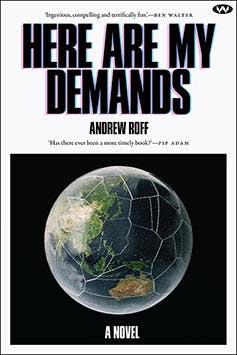What will Australia be like in 2058? A new novel imagines division, unemployment – and activism
- Written by Joanne Anderton, PhD Candidate, Creative Writing, The University of Queensland

Maggie Garewal believes in the possibilities of change. She lives in 2058 Ngunnawal-Canberra, and works in politics for a progressive-aligned “proxy harvester”. In this near future Australia, all legislation must be passed by plebiscite. Anyone not keen on constant voting can delegate to a proxy.
Some might call Maggie naive, but she genuinely believes with the right ideas, communicated effectively, she can make a real difference. When the progressives win office for the first time in almost 20 years, it looks like she’ll finally have her chance. She gets to work spearheading the implementation of a Universal Basic Income.
2058 Australia is an alienating place to be. Automation and artificial intelligence (AI) have devastated employment. Climate change has resulted in a surge in the arrival of refugees. The country was divided during the Surrender, the northern tips given over to a United States military protectorate and Indigenous self-governance. And then there’s the Shroud, a biometric implant that layers the virtual over the real world, blending reality with illusion.
Review: Here Are My Demands – Andrew Roff (Wakefield Press)
Maggie believes the Income will restore a level of dignity and purpose to a troubled population. But not everyone agrees, and to get it across the line she will have to negotiate with pragmatic public servants, skittish politicians, aggressive right-wing talk shows, religious fundamentalists and a violent underground resistance.
All of whom may or may not be manipulated by something deeper and more sinister: a foreign entity, or generational vested interests who will do whatever it takes to maintain power. As they have always done.
Here Are My Demands is the debut novel from Andrew Roff, whose short fiction has been published, collected and awarded widely. As a work of literary speculative fiction, it feels concerned more with the now than an imagined future. It looks forward, yes – but the view is remarkably familiar.
A sense of box ticking
Maggie provides a sympathetic perspective for experiencing the future Roff has created. Despite living in a world of cynics, she genuinely believes in the work she’s doing. At the same time, she’s a flawed human like the rest of us. The book gets its drive from the tug of war between her strengths and her weaknesses; the times she steps up (such as holding her own on a right-wing talk show) and the times she falls flat (when she attempts to flush out a mole in the ranks).
Authors: Joanne Anderton, PhD Candidate, Creative Writing, The University of Queensland





